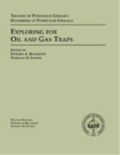Difference between revisions of "Evaluating top seal integrity"
Jump to navigation
Jump to search
FWhitehurst (talk | contribs) |
FWhitehurst (talk | contribs) |
||
| Line 14: | Line 14: | ||
| isbn = 0-89181-602-X | | isbn = 0-89181-602-X | ||
}} | }} | ||
| − | [[Fracturing]] can destroy [[top seal]] integrity. This section discusses two practical techniques for evaluating loss of top seal integrity resulting from strain or hydraulic fracturing. Sufficiently intense deformation in excess of top seal ductility can fracture a top seal. In addition, sufficiently high pore pressures in excess of the fracture pressure can induce natural hydraulic fracturing. | + | [[Fracturing]] can destroy [[top seal]] integrity. This section discusses two practical techniques for evaluating loss of top seal integrity resulting from strain or hydraulic fracturing. Sufficiently intense deformation in excess of top [[seal ductility]] can fracture a top seal. In addition, sufficiently high pore pressures in excess of the fracture pressure can induce natural hydraulic fracturing. |
==See also== | ==See also== | ||
Revision as of 19:54, 28 July 2014
| Exploring for Oil and Gas Traps | |

| |
| Series | Treatise in Petroleum Geology |
|---|---|
| Part | Predicting the occurrence of oil and gas traps |
| Chapter | Evaluating top and fault seal |
| Author | Grant M. Skerlec |
| Link | Web page |
| Store | AAPG Store |
Fracturing can destroy top seal integrity. This section discusses two practical techniques for evaluating loss of top seal integrity resulting from strain or hydraulic fracturing. Sufficiently intense deformation in excess of top seal ductility can fracture a top seal. In addition, sufficiently high pore pressures in excess of the fracture pressure can induce natural hydraulic fracturing.